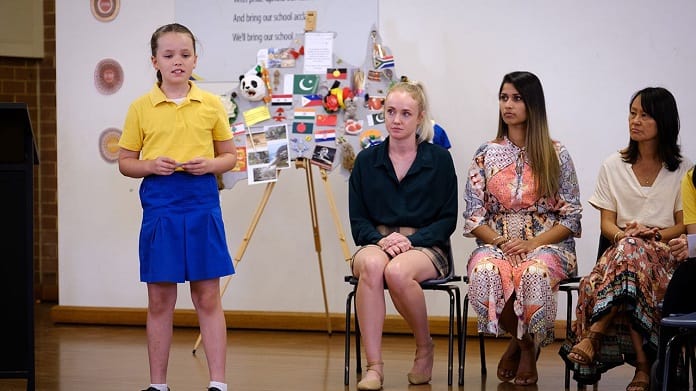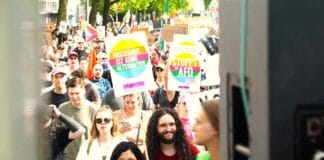The three-part ABC miniseries The School That Tried to End Racism documents the journey of a class of primary school students in the multicultural suburbs of Sydney, as they embark on an experimental school program designed to identify and root out unconscious racial bias.
It’s a touching and at times confronting look at the human effects of racism, hinting at the gaping holes that exist in the school curriculum and the national consciousness at large.
The children participate in a slew of collaborative activities prompting them to think about privilege, racial and national identity, the erasure of Indigenous history, representation, and media literacy.
One heartbreaking segment features the children and their teachers listening to two Aboriginal men tell the story of how they were taken from their families and stripped of their names as part of the Stolen Generations.
The program is constantly described as being “ground-breaking” and “revolutionary” but its content is eminently sensible. Its novelty says more about the backwardness of Australia’s curriculum than the program itself.
Privilege
There is one key weakness in the program, deriving from its liberal understanding of racism. The origin and primary expression of racism is understood to be behaviours between individuals. One activity shows this clearly.
The children are sent into a maze to retrieve four prize boxes. Those who succeeded were offered a ride back to school in a stretch Hummer. The winners were offered a chance to give up their place for a classmate—but none did.
This metaphor for privilege suggests that it is a zero-sum game, that marginalised people can only progress at the expense of the “privileged” group or perhaps by the privileged generously giving up their “privilege”.
There is no discussion on whether the premise of the game is valid, and who might benefit by it having been set up in this way. But we cannot identify and combat racism effectively without such an understanding.
Manufactured
Marx wrote that: “The ideas of the ruling class are in every epoch the ruling ideas.” Racism is encouraged to divide workers. It helps to bind workers of the dominant “race” to a national ruling class and creates a barrier to them fighting in common interest with minority workers, who are able to be more deeply exploited.
The majority workers might be better off but they have actually lost out on gains that all workers could have won through united struggle. While the majority workers might have advantages, the only real beneficiaries are the ruling class themselves.
Any history that correctly identifies such past and present injustices is a threat to this arrangement. Hence the Right is keen to ensure that the next generation remains as ignorant as possible about racism and its effects.
In the United States, conservatives have manufactured outrage among some parents against so-called Critical Race Theory, attempting to shut down any teaching about how racism remains deeply structured into society.
In Australia, Liberals like federal Education Minister Alan Tudge have come out swinging against modest proposed changes in a recent review of the Australian curriculum that would include recognising the colonisation of Australia as an “invasion”.
If children realise that the common prejudices in society are not just lies but have been systematically promoted by generations of ruling class bullies, it would be harder for the ruling class to use those prejudices to manipulate them as adults.
Overworked
There is another question hovering in the background of the show: who would actually do the teaching if things were scaled up so that all children had access to this kind of anti-racist education?
Teachers are overworked and, if the curriculum review is anything to go by, things are set to get worse.
The review proposes a heavier focus on literacy and numeracy in primary school at the expense of arts and humanities. The old phonics and decoding approach to teaching English would be re-emphasised.
The children in the show were exempted from normal classes for three weeks and the program was taught by teachers with special training. Each child and their parents consented to taking part.
It will not be so easy to run such programs at scale and this is not lost on the designers, who include one of the narrators, Professor Fiona White from the University of Sydney.
White noted in an interview with The Education Magazine that periodic “booster programs” would be needed, “supported by positive messaging from parents, family, the media and the government”.
In practice, this would entail a sustained political campaign led by teachers against the racism of the Liberals, and to shrink class sizes and grow the teaching workforce. It would not be possible to properly run anti-racism programs otherwise.
This would be the toughest industrial struggle in the education sector in a generation. But aside from the thousands of new jobs that would be won, the miniseries shows it would all be worth it for the kids, too.
Insulate
Whatever its theoretical faults, the show demonstrates something all anti-racists know to be true: children are not born racist.
Children learn prejudices and this can happen despite the best efforts of their parents, who can never totally insulate children from bigotry in wider society.
In interview segments, the children all declare themselves to be optimistic and altruistic about human nature.
During the maze activity, one student actually notes aloud that the Hummer could fit them all, coming tantalisingly close to questioning why they couldn’t all ride it back to school.
And in the closing scenes, a budding cross-cultural friendship between two of the students is shown.
As always, one finds boundless potential in children. The program armed its students with the skills to build lifelong friendships across racial boundaries. But when they then encounter the ruling minority that is the source of racism itself, it will be the task of socialists and anti-racists to teach them the skills of struggle.
By Jason Wong
The School That Tried to End Racism is available on ABC iView.






